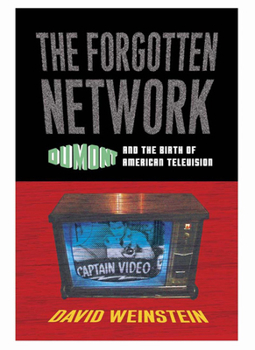The Forgotten Network: Dumont and the Birth of American Television
Select Format
Select Condition 
Book Overview
During the late 1940s and early 1950s, the name DuMont was synonymous with the new medium of television. Many people first watched TV on DuMont-brand sets, the best receivers money could buy. More... This description may be from another edition of this product.
Format:Paperback
Language:English
ISBN:1592134998
ISBN13:9781592134991
Release Date:March 2006
Publisher:Temple University Press
Length:240 Pages
Weight:0.67 lbs.
Dimensions:0.6" x 5.6" x 8.2"
Customer Reviews
3 ratings
The Forgotten Network: DuMont and the Birth of American Television
Published by Thriftbooks.com User , 18 years ago
Extremely well written and virtually 100% accurate. David Weinstein is to be lauded for his well researched and well documented effort. This is must reading for all students of the history of media. The best book available about The DuMont Television Network, its trials and tribulations. It demonstrates how creative, early DuMont programming still influences network decisions today.
Dying at dawn...
Published by Thriftbooks.com User , 20 years ago
At the dawning age of network television, DuMont was at least a player in the struggle to create programming that America's households would tune their newly purchased TVs into, in 1949, but by 1953 they were pretty much licked, and by the spring of 1955 they were out of the picture completely and literally.Based on Weinstein's carefully researched and well-organized recounting of the history of DuMont, it is amazing that the network lasted as long as it did. The two major networks, NBC and CBS, had powerful lobbyists who would walk right into the offices of the FCC or the halls of Congress and unashamedly dictate regulations or rulings or legislation that openly favoredNBC and CBS, while making it difficult for ABC and impossible for DuMont to expand. ABC survived by forging strong ties to Hollywood studios, but an earlier alliance between DuMont and Paramount was nothing but complete disaster for DuMont. In fact, just about everything was a disaster for DuMont... they were even screwed horrendously by AT & T on coax cable rental fees.DuMont had no money, but they did have creativity, born of genuinely bare necessity. Director of Programming James Caddigan and a bunch of people often literally hired off the street came up with innovative programming ideas which can now be seen to have shaped the direction of all network television programming in the decades to come. Yet even here, DuMont was doomed to lose. Once they had hold of a hot thing, they never had the money to develop it properly, or to retain the performers involved under contract.Weinstein devotes the first three chapters of this roughly 220-page book to the rise and fall of Allan B. Du Mont as manufacturer and (disinterested) network head. He then turns to the areas in which DuMont's plow first broke the plains, with chapters on daytime TV programming aimed at housewives; on CAPTAIN VIDEO, the first and maybe the greatest of the live space adventure series of television's Golden Age; on DuMont's first successful variety host, Morey Amsterdam; and on its first superstar, Jackie Gleason. Also covered are DuMont's two popular and pioneering police procedural dramas; its surprisinglysuccessful venture into religious programming, with the charismatic and sinister Bishop Fulton J. Sheen; as well as an experiment with late-night programming guided by comic genius Ernie Kovacs.Often in reading books on TV of the early 1950s one quickly realizes that the author's knowledge of the programs is entirely due to having read a few TV-Guide-type articles on the programs, from that era... in other words, he hasn't a clue. Weinstein, born in 1967, was well aware of this pitfall and he has made an energetic effort to locate and view kinescopes of presumably typical broadcasts of each of the programs he discusses. As a result, he can describe in detail the unique signatures that DuMont's always low budget and often great creativity brought to their successful series.The book is carefully foo
More than just Dumont
Published by Thriftbooks.com User , 20 years ago
This book is a must-read for anyone interested in television and media history, for one, but also popular culture in general. It is well-written, accessible, interesting . . .every time i was thinking of a comment or question, the author seemed to read my mind and addressed my thoughts within a couple of paragraphs. I wish I still taught media studies--I would have my upper-level and grad students read this book, especially for its admirable avoidance of acadmic jargon. Weinstein finds a way to speak about the formation and growth of early television that is clear, informed and makes me think differently even about the television i watch today, even about contemporary media. I thoroughly enjoyed this book.






